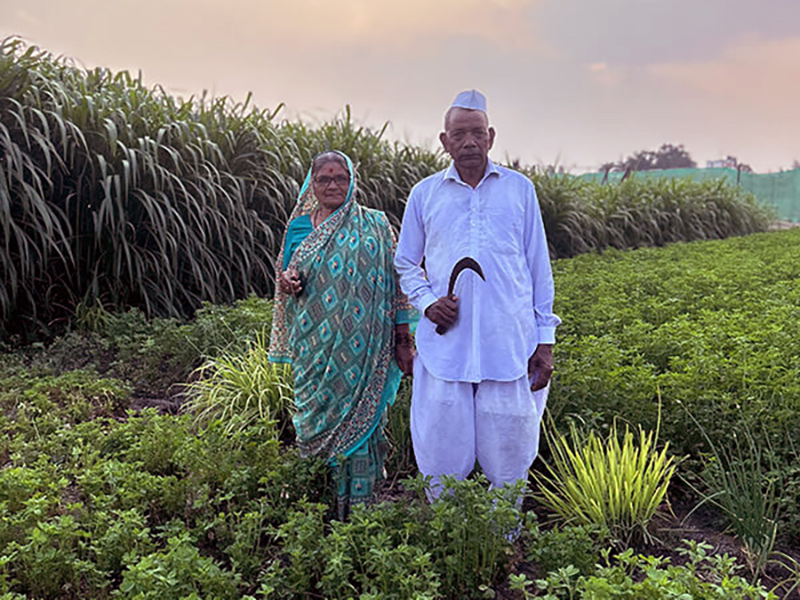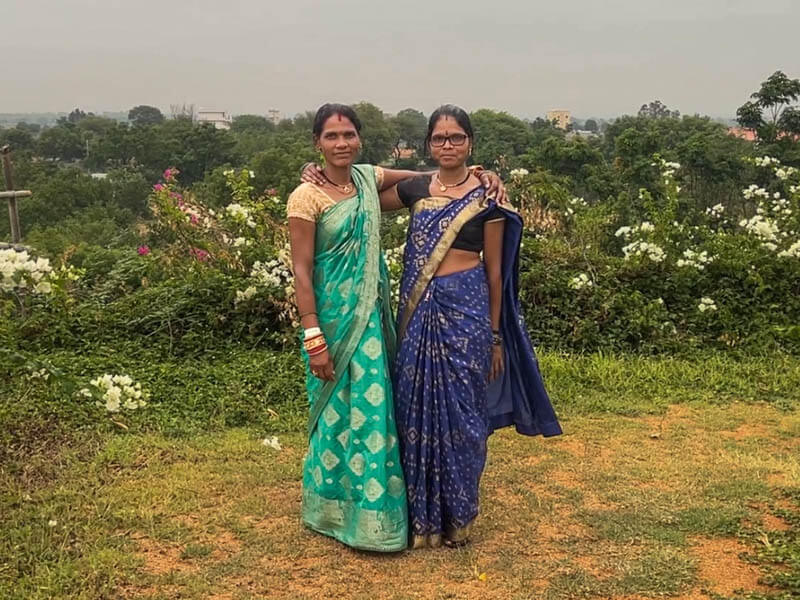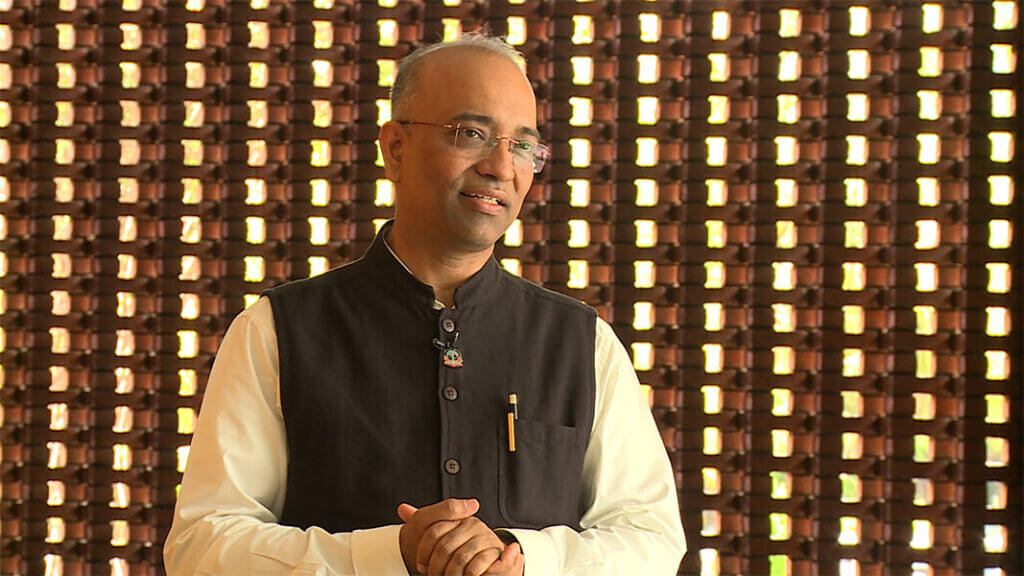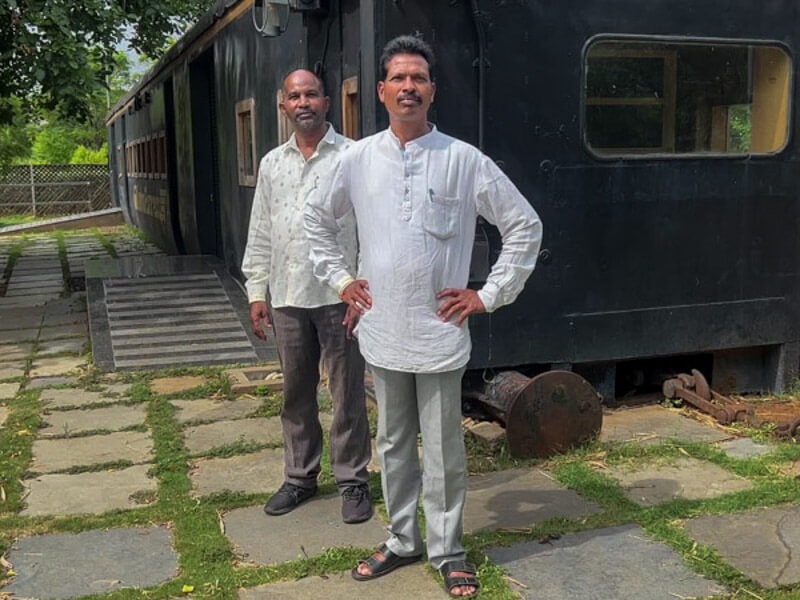The 500-odd farmers of Gurha Kumawatan, a village in arid Rajasthan, are now millionaires thanks to polyhouse farming. Their hard work, innovation and unlimited ambition offers a path to prosperity for others in India.
Nearly 75% of Indian farmers own less than two acres of land. Farmer producer companies owned and managed by small farmers offer a way out of chronic distress.
 TR Vivek
TR Vivek 
Savita Gadre, 38, is a short, wiry and proud woman. It’s likely her flesh and bones are sinewed by chutzpah. Clad in an aquamarine sari with chunky silver embroidery, Gadre and her colleague Ramshila Kudape, are at a spiritual ashram on the outskirts of Hyderabad to attend the annual Lighthouse Conclave of farmer producer companies (FPC) organised by Samunnati, one of India’s largest private sector financiers in agriculture.
Her home in Temani Khurd village, 25km from Chhindwara in Madhya Pradesh is far away from pretty much everywhere. The trip to Hyderabad would take four instead of the scheduled two days. Gadre’s husband groans on the phone that she’s been away too long neglecting her domestic duties. “Hum BOD [board of directors] hain. Haan ghar se baahar hain, par aapka hi toh naam roshan kar rahe hain [yes, I’m away from home, but I’m only making you proud],” snaps Gadre.
Fruits of success
Gadre and Kudape are directors on the board of an all-women FPC called Chhindwara Organic Farmers Enterprise (COFE).
A farmer producer company or FPC is a social enterprise that’s a hybrid between a cooperative, such as Amul, and a private limited company. An FPC can be formed when 10 or more farmers in a region band together. But it has to be owned and managed by its member-farmers.

COFE has more than 900 women farmer members across 214 predominantly tribal villages. The FPC, founded with the help of an NGO called Srijan which ran a self-help group (SHG) for women, works with farmers who harvest custard apples as forest produce. The women used to lug 25kg of custard apples for 10km to sell them for as little as Rs 50. Now, thanks to the power of collectivisation, they make almost ten times more. COFE processes the custard apple pulp, packages, freezes and sells it to large ice cream companies like Dinshaw’s in Nagpur at Rs 180/kg.
With the experience of operating a cold chain, the company now also sells frozen peas gathered from local women farmers when custard apples aren’t in season. It also has a dal processing plant with a capacity of one tonne a day and supplies organic cotton grown by its members to local ginning mills.
“In the past, we had no identity of our own. When someone came visiting and if my husband or any male member of the family was not at home, my natural response was only to say ghar pe koi nahi hai [there’s no one home] and rush inside. Now we meet buyers in big cities, find new orders and run the whole business by ourselves,” says Gadre. COFE has a turnover of Rs 57 lakh.
Creating 10,000 FPCs such as COFE across the country is a keystone in the government’s plans to increase chronically low small farmer incomes. To develop the FPC movement in the country, the government has made a budgetary allocation of Rs 6,865 crore besides a raft of other schemes to increase the access to money and markets for such companies.
The way out of distress
Nearly 75% of Indian farmers own less than one hectare of land–barely the size of a cricket field. The average monthly income of an Indian farming household, according to the latest government data, is Rs 10,218. That roughly translates to Rs 340 a day, at par with daily wages unskilled labourers in many states get under the Mahatma Gandhi National Rural Employment Guarantee Act (MGNREGA).
“To be a farmer in India is like fighting a ten-headed Ravana. When you think you’ve solved one problem, and nine more crop up. We are up against countless invisible and unpredictable factors. First, there is nature. A whole year’s hard work can be washed away by unseasonal rains at harvest time; water shortage kills us. The global prices may crash or the government might change its policy overnight. There is simply no way a small farmer can win. Indian farmers have a choice. They can collectivise or quit,” says Vilas Shinde, the founder and chairman of Sahyadri Farms, India’s largest FPC based in Nashik with a turnover in excess of Rs 1000 crore.
The Indian agro-economy is pretty much designed to make the smallholder farmer fail. Small farmers buy all their inputs (pesticides, seeds, fertilizers and equipment) at retail rates and sell their output at wholesale prices. They have absolutely no bargaining power when buying or selling. But collectivising offers a way out of the rut.
“FPCs enable small farmers to come together and negotiate better prices for their produce. By pooling their resources, they can command better market access, negotiate fair prices, and reduce their dependence on middlemen. This enhances their income and improves economic sustainability,” says Anilkumar SG, CEO, Samunnati, a Chennai-based company that finances FPCs, creates market linkages for them and offers advisory services.

The idea of FPCs was mooted by a government committee headed by economist YK Alagh in 2000. In 2003 the creation of a special class of companies called FPCs was legislated by an amendment to the Company Act, 1956. But a national policy for the promotion of FPCs was put in place only by 2013.
FPCs enable small farmers to come together and negotiate better prices for their produce. By pooling their resources, they command better market access and reduce dependency on middlemen.

The taste of Amul
“India has a long history of farmers cooperatives playing an active role in supplying credit and farm inputs and organising marketing. Experience of dairy cooperatives, especially the farmer-owned and operated Amul model in mobilising milk surplus from millions of small holders is a great success story. FPCs can have a similar impact on other segments of farming,” says Ramesh Chand, member Niti Aayog.
Unlike cooperatives, the FPCs are free of government nominees on its board. That helps them evade political interference, be in full control of operations and employ the entrepreneurial energy of the member farmers to the fullest.
FPCs can establish direct market linkages for farmers, enabling them to bypass intermediaries and access larger markets. They can also facilitate value addition activities such as processing, packaging, and branding, which increase the profitability of agricultural produce.
For farmers, being mere suppliers of raw material is a recipe for declining income. Any value addition, even something as simple as sorting and grading of produce, or basic packaging closer to the farm becomes an economic multiplier. By providing access to markets and value-added opportunities, FPCs help small farmers capture a larger share of the value chain.
A richer blend
The Araku Valley in Andhra Pradesh’s northeastern edge bordering Odisha has now become one of the more fashionable coffee supplying regions. The small plantations owned almost entirely by tribal farmers in the low altitude hills of Eastern Ghats still remain untouched by the intensive chemical farming practices of Karnataka’s Kodagu and Chikkamagaluru coffee belts. While the cachet of Araku’s arabica coffee increases among consumers, the tribal farmers who grow them are far from prosperous.

“The lack of awareness is such that our coffee farmers in Araku continue to sell their produce to the middlemen at whatever price they quote,” says Gabbada Chittibabu, a seven-acre coffee farmer in the region who is now a director at an FPC called Manyatorana. The company created in 2019 has more than 1000 members and deals in turmeric and pepper as well.
“Once we organised ourselves as an FPC, we had the scale to process the berries into beans and warehouse it instead of selling at throwaway prices,” says Chittibabu. Manyatorana sells its beans to Tata Coffee (some of it ends up in Starbucks’ blends sold in India) and Blue Tokai. Working with large institutional buyers not only guarantees fair procurement but also improves crop quality based on their feedback and inputs. Manyatorana plans to increase its turnover from the current Rs 3 crore to Rs 15 crore in the next two years as its membership expands.
The fragrance of cooperation
The town of Pushkar in central Rajasthan’s Ajmer district is one of the biggest rose growing regions in the country. Nand Kishor Saini, a 38-year-old rose farmer with a postgraduate degree describes the condition of fellow farmers in the region as pitiable. Saini is the CEO of the Pushkar Rural Agricultural Youth and Employment Producer Company, an FPC set up by an NGO called Krishak Vikas Sansthan that works with more than 500 rose farmers as its shareholders.
Founded in 2015, the company processes the rose and amla its members pool together into value added products such as gulkand, candy and murabba or sweet pickles. With a gulkand processing capacity of 1200 tonnes a year, it sells its products direct to consumers under the brand name Pushkarwala. Procuring at scale for value addition not only allows the company to pay farmers in its network Rs 20/kg more than market rates, but also work with them consistently using modern techniques to increase productivity.
In the Rajput dominated villages in the rose catchment of Pushkar, the social acceptance for women to go out and work remains fairly low. The company works with 300 women to extract the petals, sort and grade them and in the process earn Rs 250-300 a day.
Saini is a relentless travelling salesman setting up stalls at exhibitions across the country organised by National Bank for Agriculture and Rural Development. Pushkarwala’s differentiator among the hundreds of manufacturers in the region is that its gulkand is made over sixty days instead of the hurried 24 hours others take. “Anyone who tastes our product will become our long-term customer. We have 60-70 permanent buyers especially in south India. We plan to start exporting our products soon,” says Saini.
A capital problem
The other big advantage of FPCs is that they help small farmers access formal credit and financial services, which are often inaccessible to individual farmers. They can negotiate better credit terms, avail group loans, and improve access to agricultural inputs, technology, and infrastructure. This enhances productivity, efficiency, and the overall competitiveness of small farmers. The ability of farmers to collectively manage risks such as price volatility, natural disasters, and market uncertainties makes it feasible for private lenders like Samunnati, public sector banks and institutions like NABARD to channel loans to farmers through the FPCs.
To sell inputs like seeds and fertilizers at discounted price to farmers and procuring produce at a better price from farmers are crucial for them in building trust and engagement among member farmers. For that, timely availability of working capital is critical.
But given that most FPCs in India are fairly young with a low capital base, little formal credit history, collateral, and financial history, they find it difficult to secure loans from traditional financial institutions. “We use a unique underwriting mechanism based on ‘social capital’ and ‘trade capital’. Evaluating the historical relationships with the FPCs’ suppliers and buyers would indicate their performance potential. This makes them eligible for working capital loans to conduct efficient business and strengthen their member engagement,” says Samunnati’s Anilkumar.
Samunnati links up FPCs with large buyers such as ITC, traders, processors and exporters. This helps FPCs eliminate transaction costs by bypassing numerous middlemen.
And after one or two cycles of working capital and repayments, FPCs attain the scale necessary to sustain their operations.
And after one or two cycles of working capital and repayments, FPCs attain the scale necessary to sustain their operations.
Building leadership
Even with policy support, there are many challenges in the path towards creating thousands of Amul-like winners in a wide range of agricultural commodities.
To begin with, there is a lack of awareness among farmers of the benefits and potential of forming FPCs, let alone the many incentives offered by central and state governments. Convincing farmers to unite and collaborate could be even harder. “Farmers need to see tangible benefits from collectivization to be motivated to participate. To win their trust, you must demonstrate the gains quickly and in a transparent manner,” says Sachin Thube, a journalist who founded a successful FPC called Green Up in Maharashtra’s Ahmednagar district.
Most importantly, FPCs need sound governance structures and strong leadership. Several stakeholders in the ecosystem including Sahyadri, Samunnati, NABARD, NGOs and philanthropies such as the Deshpande Foundation run FPC capacity building and leadership development programmes. But that’s no match for the personal drive and determination of farmers such as Savita Gadre in taking charge of their destiny.
The 500-odd farmers of Gurha Kumawatan, a village in arid Rajasthan, are now millionaires thanks to polyhouse farming. Their hard work, innovation and unlimited ambition offers a path to prosperity for others in India.
Mai FPO- Uldan agriculture producer company Limited jhansi ka Director hun, mere kshetr m moongfali bhut hoti h lekin bazar na milne s yhi lokal के vyapariyo ko dena pdta, yhi hall urd, Moong, matar, masoor ki avm gehu m bhi h, moongfali k dana v sabhi dalhan ki dalo avm gehu ki khred krne hetu help kre,
Jwaar, bajra ki bhi khred kr ske, Thankyou sir